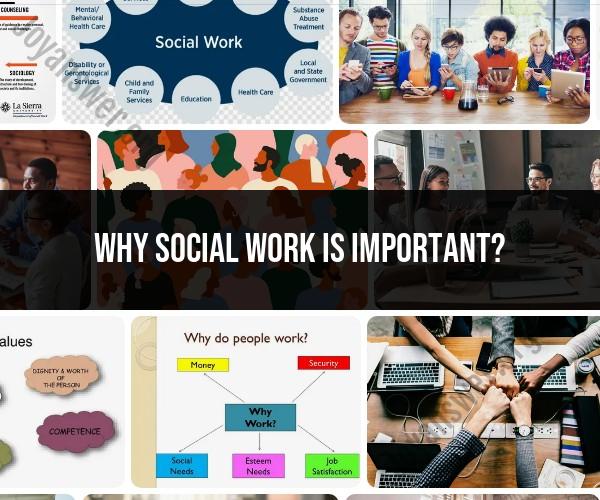Why social work is important?
Social work is an important profession that plays a vital role in society for several reasons:
Advocating for Vulnerable Populations: Social workers are often advocates for individuals and communities who are marginalized, disadvantaged, or facing social injustices. They work to ensure that the rights and needs of these populations are recognized and addressed.
Promoting Social Justice: Social workers are committed to social justice and equality. They work to challenge and change systems and policies that perpetuate discrimination, inequality, and oppression.
Supporting Mental and Emotional Well-Being: Social workers provide valuable support to individuals and families dealing with mental health issues, trauma, and emotional distress. They offer counseling, therapy, and resources to help people improve their mental well-being.
Child Welfare: Social workers play a crucial role in child welfare, protecting children from abuse and neglect, ensuring their safety, and helping families navigate complex situations to provide a stable and nurturing environment for children.
Helping Those in Crisis: Social workers are often the first responders in times of crisis, such as natural disasters, emergencies, or traumatic events. They provide immediate support and help individuals and communities recover.
Community Development: Social workers work with communities to identify their needs and strengths. They help communities develop programs and resources that enhance their quality of life and address social issues.
Assisting the Elderly: Social workers specializing in gerontology provide essential services to older adults, including helping them access healthcare, housing, and social services. They also address issues related to aging and end-of-life planning.
Supporting Families: Social workers assist families facing challenges such as substance abuse, domestic violence, or poverty. They help families access resources and develop coping skills to improve their well-being.
Mental Health Services: Social workers are integral to the mental health field, providing therapy, counseling, and support to individuals with mental health disorders. They help people manage their conditions and lead fulfilling lives.
Crisis Intervention: Social workers are trained in crisis intervention and can provide immediate support to individuals in crisis, including those experiencing suicidal thoughts or substance abuse issues.
Preventing Homelessness: Social workers work to prevent homelessness by connecting individuals and families with housing resources, financial assistance, and support services.
Policy Advocacy: Social workers engage in policy analysis, research, and advocacy to influence legislation and policies that affect social and economic issues. They strive to create positive changes at the systemic level.
Educating and Raising Awareness: Social workers educate the public about social issues, helping to raise awareness and mobilize support for positive change.
Overall, social work is essential for creating a more just, equitable, and compassionate society. Social workers are dedicated professionals who make a significant impact on the lives of individuals, families, and communities, working tirelessly to address societal challenges and improve the well-being of all members of society.
The Future of Social Work: Job Outlook and Career Prospects
The future of social work is bright. According to the US Bureau of Labor Statistics, the employment of social workers is projected to grow 7 percent from 2022 to 2032, faster than the average for all occupations. This growth is expected to be driven by an aging population, increasing demand for mental health services, and growing awareness of social justice issues.
Social workers have a wide range of career prospects. They can work in a variety of settings, including hospitals, schools, mental health clinics, government agencies, and non-profit organizations. Social workers can also specialize in a particular area, such as child welfare, mental health, or substance abuse counseling.
Career Opportunities in Social Work: Assessing the Current Job Market
The current job market for social workers is strong. There are many job openings available in a variety of settings. Social workers with specialized skills and experience are in particularly high demand.
Here are some of the most in-demand social work jobs:
- Mental health and substance abuse social workers
- Child, family, and school social workers
- Medical and public health social workers
- Healthcare social workers
- Social and community service managers
Paving the Way: Job Prospects and Trends for Social Workers
Social workers play an important role in society, and their job prospects are expected to continue to grow in the coming years. Here are some of the trends that are driving demand for social workers:
- An aging population: As the population ages, there will be a greater need for social workers to provide services to older adults and their families.
- Increasing demand for mental health services: The demand for mental health services is increasing, and social workers play a vital role in providing these services.
- Growing awareness of social justice issues: Social workers are at the forefront of addressing social justice issues such as poverty, homelessness, and discrimination.
If you are interested in a career in social work, there are many resources available to help you get started. You can find information about social work programs, jobs, and professional development opportunities on the websites of the National Association of Social Workers and the American Association of Social Workers.
Here are some tips for increasing your chances of success in the social work job market:
- Get a bachelor's degree in social work from an accredited program.
- Gain experience through internships and volunteer work.
- Develop specialized skills in areas such as mental health, substance abuse counseling, or child welfare.
- Network with other social workers and professionals in your field.
- Stay up-to-date on the latest trends and developments in social work.
By following these tips, you can pave the way for a successful career in social work.












